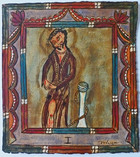Station I: Christ is Condemned by Pilate
My kingdom is not of this world. (John 18:36)
What is truth? Actors know a good line, when they hear one, and those who have played Pontius Pilate in Hollywood sandal and toga epics on the life of Christ deliver this famous quote from John 18:38 with every conceivable nuance and intonation. They are aloof, angry, bored, bemused, curious, cynical, dismissive, doubtful, hopeful, hate-filled, irritated, irresolute, nostalgic, neurotic. It’s amazing what nuances can be found in three little words!
Pilate’s encounter with Christ might have been a pivotal moment in human history, when the destiny of the world turned on the answer to that question. The Roman Governor never gave Christ the chance to reply. Reading on in the Gospel of John, I get the feeling Pilate’s remark was a throw-away line, fired off as he exited the room to confer with what he viewed as a group of troublesome Jews, pressuring him to punish another good-intentioned but naïve prophet from the provinces.
Two kinds of power were contending in the Hall of Pilate that day. This is the only time in the gospels, when Jesus directly confronts the secular rulers of his age. How does he respond? He shows complete indifference to this man who represents the greatest empire the world had ever known with legions of soldiers at his command and the authority to put his subjects to death. Jesus tells Pilate his kingdom “is not of this world.”
Christ had been tempted once by the Devil in the wilderness with the allure of earthly power and would have none of it. What mattered more to him was truth. If the Roman Governor of Judea had really wanted an answer to his provocative question, Jesus might have told him, as he did his disciples in John 14:6, that he was “the way, the truth, and the life.”
Pilate believed he had better things to do than debate theology with some itinerant country preacher, who had been rejected by his own people. Rome’s representative in Judea chose the path of political expediency and sentenced Christ to death. Then, like any politician worthy of his profession, he washed his hands of the whole sorry business.
The irony, of course, is that were it not for Pilate’s brief meeting with Christ, he would merit no mention in history books--just another in a long line of undistinguished, uncelebrated and unlamented colonial administrators, who were capricious, cruel, and willfully ignorant of the subjugated people they ruled. According to Christian tradition, the ex-Governor of Judea ended his life by his own hand in the province of Gaul, exiled far from the center of power in Rome. So, who really sat in judgment that day in Jerusalem?
It is so easy to be distracted by ambition and power and greed, as if losing my soul were a small price to pay to gain the whole world. Help me to live my life, so the call of your kingdom comes first. Amen.
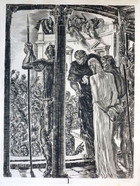
Albert Decaris
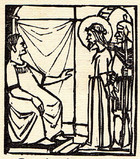
Jean Marchand
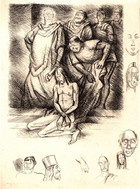
Andre Collot
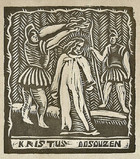
Unknown Czech artist

Elisabeth de la Mauviniere
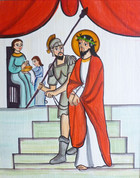
Marie Romero Cash
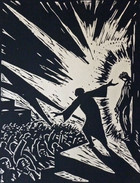
Max Thalmann
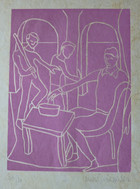
Adrian Wiszniewski
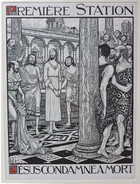
Louis Jou

Master of the Stalag VI D Stations
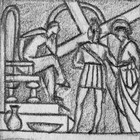
Arthur Kemp
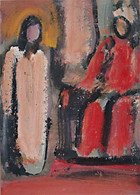
Georges Rouault
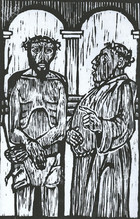
Charles Aldridge
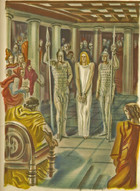
Albert Decaris
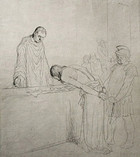
William Strang
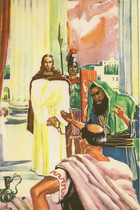
Dirk Gringhuis
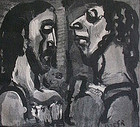
Georges Rouault
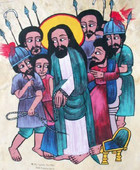
Unknown Ethiopian Artist

Arthur O. Scott
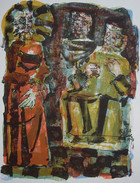
Paul Aizpiri
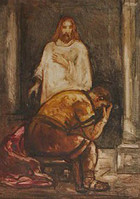
Eugene Higgins
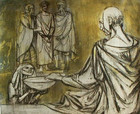
Pat M. Mallinson (Allman-Smith)
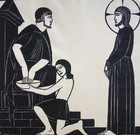
Eric Gill
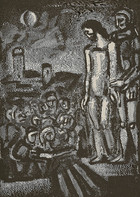
Georges Rouault
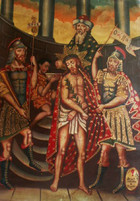
Unknown Peruvian Artist
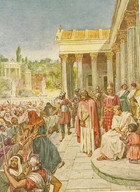
William Hole
